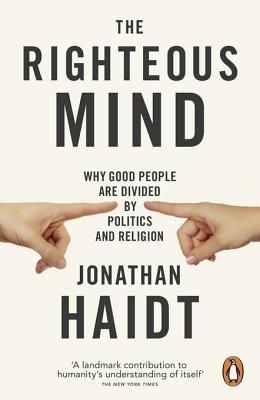More on this book
Community
Kindle Notes & Highlights
Keith Richards
the choir master dumped them.
you want to breed a rebel, that’s the way to do it. … It still hasn’t gone out, the fire.
Moral, Believing Animals,
Christian Smith
“grand narratives,”
Each narrative, he says, identifies a beginning (“once upon a time”), a middle (in which a threat or challenge arises), and an end (in which a resolution is achieved).
“liberal progress narrative,”
struggle for the good society
Drew Westen
The Political Brain
Reagan narrative
heroism of defense.
Loyalty to a group shrinks the moral circle;
Authority is oppression.
Sanctity is religious m...
This highlight has been truncated due to consecutive passage length restrictions.
Conservatism.It
Jerry Muller.
distinguishing conservatism from orthodoxy.
Orthodoxy is the view that there exists a “transcendent moral order, to which we ought to try to conform the ways of society.”
distinguished conservatism from the counter-Enlightenment.
modern conservatism, Muller asserts, finds its origins within the main currents of Enlightenment thinking, when men such as David Hume and Edmund Burke tried to develop a reasoned, pragmatic, and essentially utilitarian critique of the Enlightenment project.
What makes social and political arguments conservative as opposed to orthodox is that the critique of liberal or progressive arguments takes place on the enlightened grounds of the search for human happiness based on the use of reason.
kind of conservatism that could compete against liberalism in the court of social science?
Conservatives believe that people are inherently imperfect and are prone to act badly when all constraints and accountability are removed
Our reasoning is flawed and prone to overconfidence,
Institutions emerge gradually
as social facts, which we then respect and even sacralize, but if we strip these institutions of authority and treat them as arbitrary contrivances that exist only for our benefit, we render them less effective.
Edmund Burke
Friedrich Hayek
Thomas ...
This highlight has been truncated due to consecutive passage length restrictions.
moral capital.(Please
Social capital
we can define moral capital as the resources that sustain a moral community.
moral capital is not always an unalloyed good.
tends to overreach, change too many things too quickly, and reduce the stock of moral capital inadvertently.
John Stuart Mill
party of order or stability, and a party of progress or reform, are both necessary elements of a healthy state of political life.”
ban lead additives from gasoline
up to half of the extraordinary and otherwise unexplained drop in crime that occurred in the 1990s.57
Liberals who continued to fear government as the chief threat to liberty became known as “classical liberals,”
large-scale human societies are nearly miraculous achievements.
Robert Putnam has provided a wealth of evidence that Burke and Smith were right.
ethnic diversity seem to cause a reduction in social capital.
bridging capital refers to trust between groups, between people who have different values and identities, while bonding capital refers to trust within groups.
diversity reduced both kinds of social capital.
Diversity seems to trigger not in-group/out-group division, but anomie or social isolation. In colloquial language, people living in ethnically diverse settings appear to “hunker down”—that
The third-century Persian prophet Mani preached that the visible world is the battleground between the forces of light (absolute goodness) and the forces of darkness (absolute evil).
Manichaeism,
“civility pledges,”


